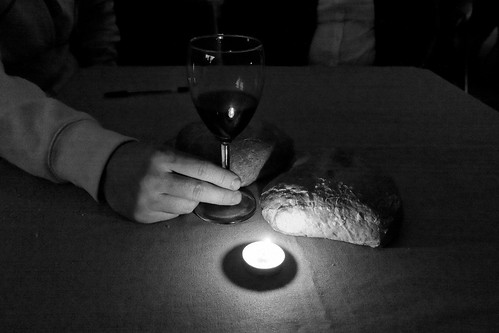
Friday in the 6th Week of Ordinary Time (II)
Supplements Or The Complete Meal
Readings: James 5:9-12; Psalms 103:1-2, 3-4, 8-9, 11-12; Mark 10:1-12
Picture: CC Ayres no graces
Blood donors are often offered iron tablets after making a donation. As I understand it, the pills are meant to help their bodies to replenish the blood that has been drawn. They are offered only as supplements. No donor in his/ her right mind will view them as a complete meal. Imagine what would happen if someone decided to live solely on iron tablets and nothing else! Quite unthinkable, not to say laughable!
And yet doesn’t something similar seem to happen in discussions over spiritual matters? It’s quite undeniable, for example, that we live in a culture that is too much focused on the practical and the functional, to the extent that people often lose touch with who they are and why they do what they do. The danger in such a mentality becomes obvious, for example, when questions arise over how to deal with the aged and infirm, those who don’t seem able any longer to contribute to society in any practically useful way. In such a context, it’s quite understandable that many spiritual advisors have taken to reminding us of the distinction between being and doing. The idea is that we must not forget our inherent human dignity, our identity as daughters and sons of a loving heavenly Father. Surely this is a valid and even crucially important reminder. But it’s also important to remember that this advice is a supplement offered to repair a perceived deficiency. It would be quite ridiculous for anyone to think that we are meant only to be and so try to stop acting altogether. After all, as St. Thomas Aquinas tells us, acting follows upon being (agere sequitur esse).
This too appears to be the problem that the author of the first reading is facing today. The polemical tone of the reading is quite obvious. This is the way to talk to people of that kind, that is, people who emphasize faith as an adequate substitute for good deeds. Don’t such people bring to mind the foolish blood donor who tries to subsist on a diet of iron tablets alone? No, the point being made in the first reading is that one shouldn’t treat a supplement as a complete meal. Faith without good works is dead.
But that’s not all. Isn’t James’ argument itself also a supplement prescribed for a perceived deficiency? Shouldn’t we be careful about interpreting the reading in such a way as to treat good deeds as a complete meal? Consider, for example, someone who might be very busy with all sorts of charitable activities, but whose personal and familial life is in shambles. No doubt, for such a one, there may indeed be many good deeds to show, but might we not be forgiven for wondering at the extent to which they are truly manifestations of faith?
Clearly the same principle applies in the spiritual realm as in the medical: supplements are not meant to substitute for the complete meal. And it’s providential that, in the gospel today, Jesus reminds us what this meal is, the same meal in which we are partaking at this Eucharist. If anyone wants to be a follower of mine, let him renounce himself take up his cross and follow me… For… anyone who loses his life for my sake, and for the sake of the gospel, will save it… Calling oneself a faith-filled Christian is insufficient if one isn’t willing to lose one’s life. Just as losing one’s life is inadequate if it’s not done for the sake of Christ and the gospel.
How are we being invited to continue feasting on the complete meal today?
There is this gnawing question: Can something good come out of charitable deeds, no matter how misplaced the intention? It’s hard to read into people’s heart, let alone your own.
ReplyDeleteHaving said that, it behooves us to be circumspect and be wary of those who may either take advantage of one’s generosity (whatever the reason), or those who may just hope for assistance instead of pulling up their own bootstraps.
Sola fides and sola caritas (not sure if it’s an appropriate expression) cannot exist but in juxtaposition. One without the other does not resonate. The vertical dimension of the cross is not complete without embracing the horizontal – our fellow creatures.
A holistic approach to life takes us into loving self, loving others as an expression of loving God. The God of love expects no less.